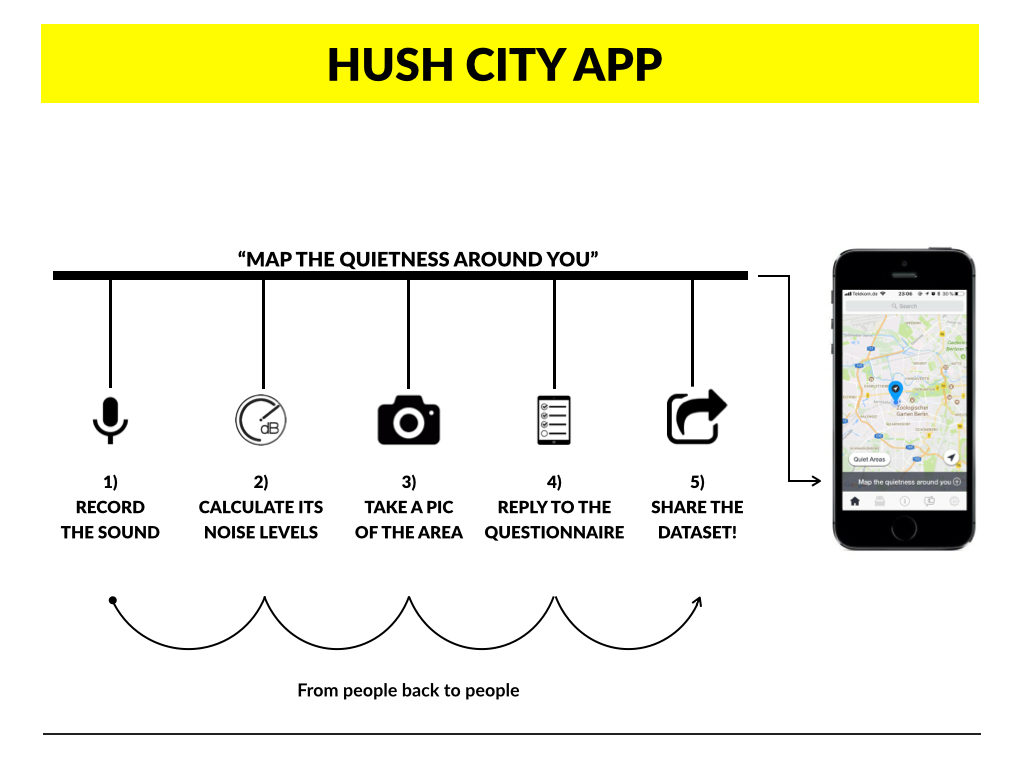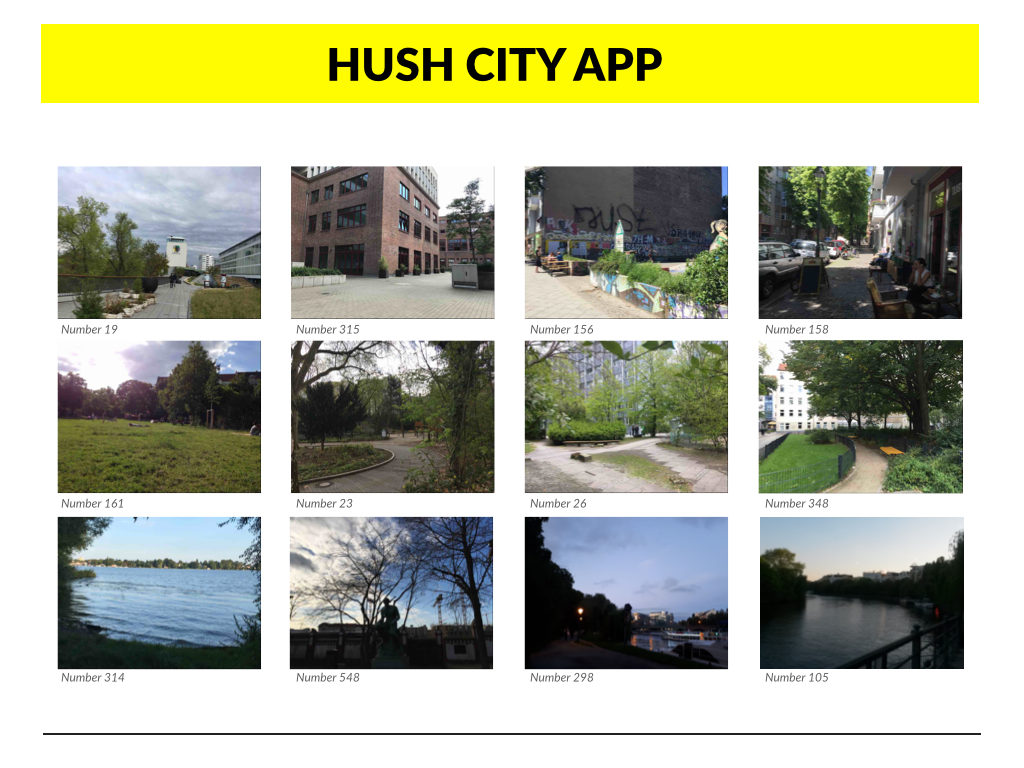
Antonella Radicchi
Architect and Urbanist, PhD
HUSH CITY APP
DESCRIPTION
Hush City is a free, citizen science mobile app, which empowers people to identify and assess quiet areas in cities as to create an open access, web-based map of quiet areas, with the potential of orientating plans and policies for healthier living, in response to issues framed by European environmental policies (e.g. the EC END 49/2002).
Our cities are becoming noisier by the hour. Only in Europe, over 125 million people are affected by noise pollution from traffic every year (EEA 2014), and apparently, quietness is becoming a luxury available only to a few of us. By using this free mobile app, you will contribute to making quietness available to all those who appreciate it and you will generate open data, which can be exploited by policy makers and planners to monitor and protect the quiet areas crowdsourced.
Hush City app will help you to identify, access and evaluate everyday quiet areas in your neighbourhoods. You can find places such as small, quiet spots where you can go to escape the city’s chaos, relax, read a book, play with your kids, and have a pleasant conversation.
Launched in 2017 within the context of a pilot study in Berlin, Hush City is now used internationally and available in 5 languages: English, German, Italian, Spanish and Portuguese.
Hush City is adopted by the City Councils of Berlin (2018) and Limerick (2020-2021) for the creation of the Quiet Areas Plans.
Join the Hush City community. It is simple!
- Download the free Hush City app and install it on your smartphone
- Go to one of your favourite quiet places
- Launch the Hush City app and click on the button “Map the quietness around you”
- Record the sound of the quiet place where you are and measure its sound levels*
- Take a picture of the place where you recorded the sound
- Answer the questions addressing the environmental quality of this quiet place
- Share this information with the Hush City community.
Or, use the app to find a quiet spot near to you. Go to it and enjoy spending some time there.
* Please be aware that noise levels measured by the mobile app, may not be entirely accurate, depending on which smartphones are used, weather conditions and other factors.
SEE WHAT HUSH CITY CAN DO!
Watch the Hush City Teaser here. This video was made by Limerick City & County Council, with the support of the EPA.
DOWNLOAD HUSH CITY
Hush City app is available on iTunes & Google Play Stores.
MAIN FEATURES OF THE HUSH CITY APP
Using the Hush City app, you can:
- Crowdsource your favourite quiet areas and share them with the Hush City community;
- Identify and access quiet areas in your city or in other cities worldwide, shared by the Hush City users;
- Filter the quiet areas according to their sound levels, descriptors used to tag them, quietness, visual quality and accessibility, as perceived by the users who crowdsourced the quiet areas;
- Share the quiet areas via social media;
- Review your personal surveys and delete them anytime without justification;
- Become a Hush City Ambassador;
- Give feedback on the Hush City project.
HUSH CITY MAP
The quiet areas crowdsourced with the Hush City app are open access and available on line via the Hush City Map.
IMPACT
Hush City is included in the EC Joint Research Centre Technical Report (Ponti & Craglia 2020) among the European citizen-generated data projects impacting public policy; and in the European Commission staff working document (2020). Best Practices in Citizen Science for Environmental Monitoring.
As a citizen science analytical tool, Hush City is featured in the WHO/UN-Habitat Sourcebook (Grant et al. 2020) Integrating health in urban and territorial planning.
Hush City is adopted by the City Councils of Berlin (2018) and Limerick (2020-2021) within the context of creation of the Quiet Areas Plans. See also: Berlin Senate (2020). Lärmaktionsplan Berlin 2019-2023. Senatsverwaltung für Umwelt, Verkehr und Klimaschutz Öffentlichkeitsarbeit, Berlin.
Full list of Press Coverage is available here.
AWARDS
2021 John Connell Soundscape Award
2019 Prix BLOXHUB Interactive, Category: Excellence, Honorary mention. Theme: “Making Urban Space More Liveable Using Digital Technology”.
2016 Falling Walls Young Innovator of the Year Award, Finalist.
YEAR
April 2017, 1st version; May 2018, 2nd version
CREDITS & ACKNOWLEDGMENTS
Hush City has been invented by Dr. Arch. Antonella Radicchi.
The Hush City’s idea originates from the concept of the Hush Expo app envisioned by Dr. Arch. Antonella Radicchi for the EXPO Milan in 2015, whose mock-up was designed by Dr. Arch. Antonella Radicchi in collaboration with Roberto Lombardo.
Hush City has subsequently been developed and implemented by Dr. Arch. Antonella Radicchi at the Technical University of Berlin, in her role as the Principal Investigator of the following projects:
- “Beyond the Noise: Open Source Soundscapes” (2016-2018) funded by the IPODI-Marie Curie Fellowship – People Program (TU Berlin/IPODI grant agreement no. 600209)
- “Hush City Mobile Lab” (2018-2020) funded by the HEAD-Genuit Foundation [research grant P-17/08-W].
Project Supervisors: Prof. Dr. Dietrich Henckel (Technical University of Berlin), Diol. Ing. Jörg Kaptain (Berlin Senate, Senate Department for the Environment, Transport and Climate Protection).
Soundscape Advisor: Prof. Dr. Brigitte Schulte-Fortkamp (Technical University of Berlin).
Acoustic Advisors: Dipl. Ing. Michael Jäcker-Cüppers (ALD, Technical University of Berlin), M.A. Manuel Frost (Berlin Senate, Senate Department for the Environment, Transport and Climate Protection), Dipl. Ing. Mattia Cobianchi (Bowers & Wilkins, UK).
The implementation of the Portuguese language in the mobile and web-based version of the app was funded by the Brazilian Association for Acoustical Quality – ProAcustica.

